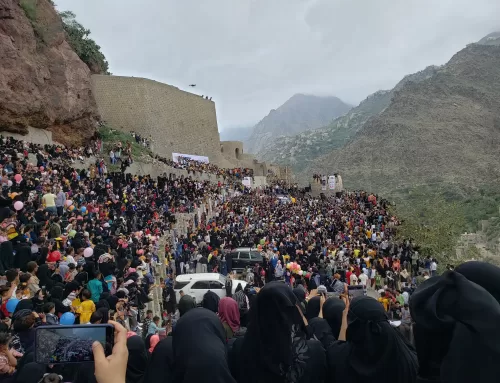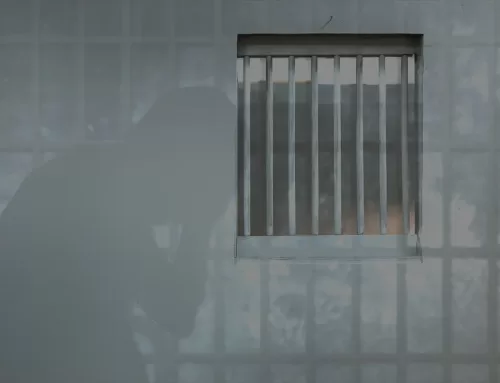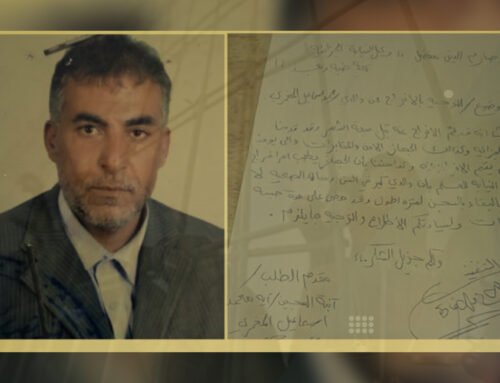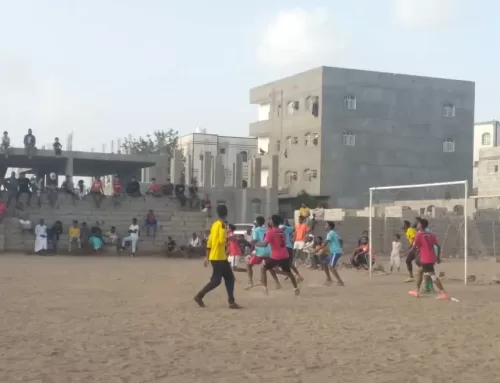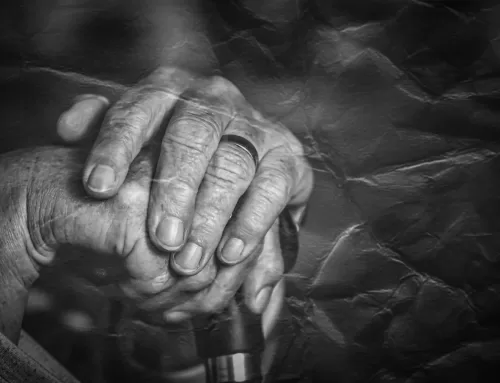They were long and dreary nights
November 17,2022
My sister and I always argued over who would sleep on the window side of the bed, enjoying the cool breeze and the rustling of the trees.
Our only concern was being together until the war broke out in 2015. We stayed away from the windows day by day, embracing in the dark and among the noises of jet fighters and bombs. The vendors left unusually early, and the children’s voices gradually faded away. We no longer smell bread wafting from neighboring houses and bakeries, nor do we hear car horns or children’s laughter.
That is what a woman told me during a women’s gathering, she was greatly affected while telling her story, as if what had happened to her just happened yesterday. As a human rights worker, I encouraged her to remember the details and requested her permission to write and publish her story, in which she accepted and went on to say:
I had never imagined that I would live in away from my city, my street, my neighborhood, my friends, and my home in Al-Mudhaffar District, Taiz city, where I spent my childhood and youth. There, I lived all moments of my maturity, sadness, joy, and sickness. We had returned from the city of Aden after attending my cousin’s wedding.
So, we went back to what we considered normal life. We awoke one night, to the sound of windows rattling and smashing. The entire city was lit up in red. We had no idea what was going on at the moment. I run to my younger siblings and hugged them. We all went to the inner room that did not face the street.
It was as if we were on the Day of Judgment, when a missile hit the place, bringing in total darkness and turning off the electricity. We could only hear the launching sound of the missile and then its explosion on the mountain, along with the screams of women and children inside the houses located below the mountain, where some rocks fell on them.
In a horrifying spectacle that resembled Resurrection, some residents ran away without even being able to get dressed. We assumed that this bombing would end after a few days. We were not able to leave the house that day because of the risk of bombings.
Communications to the city were cut off, as well as electricity. Two days later, the bombing targeted other areas. That was in early March 2015. The bombing hit an area near my uncle’s house, which sustained some damage, but none of his family was hurt. On the same day, they fled to our house, which seemed to be safe, at least from the bombing of the coalition aircraft.
Both electricity and the city’s communications were cut. The attacks changed their target two days later. It was at the beginning of March 2015. My uncle’s house was located in the area of the bombing, and although it was damaged, no one in his family was wounded. They escaped to our home that same day, where they appeared to be safe—at least from the coalition’s airstrikes.
We all gathered at the house, where the boys stayed upstairs, the women on the second floor, and the men on the first. With the passage of time, the Ansar Allah group (Houthis) took control of several areas outside of the city, and the siege appeared to worsen. There was no running water or electricity. The higher the house, the higher the cost of water. Furthermore, there was a lack of flour, vegetables, and fruits because such items were not permitted to enter the city. As a result, my father had to travel to the Bir Basha area to bring them.
The oppressive siege strengthened its grip with each passing day, and the city resembled an abandoned village. Famine began to appear in most houses. Some of my relatives chose to flee to Ibb governorate and later to Sana’a. Me, my parents, and my younger brothers were the only ones who remained in the house. They were long and dreary nights.
Due to the blockade put on the city, all clinics were closed, and pharmacies ran out of the medicine essential for my mother. It was the day of my mother’s follow-up meeting with the doctor. So, my sister in Sana’a got the medicine despite its high cost and send it with a traveler or through transport agencies that were also set to close and suspend their services.
The electricity went out for the first three days at the beginning of April 2015. We thought it would be matter of days, as my father’s medications need to be kept cold in the fridge. However, the electricity has gone forever, so the medicines spoiled. The first ten days passed with us being inside our old houses that shook and their windows smashed and scattered.
With the constant electricity outage, we resorted to using generators for two hours a day so that could charge cell phones and TV batteries and be able to watch the news. Our TV is the only source for us to know the situations outside. Then, we faced another problem… the lack of cooking gas, so we resorted to firewood.
My sisters and I used to make bread, as my mother could not stand the smoke. One of my sisters has asthma. Once, while I was lighting a fire on the roof of the house, it rained and put out the fire with which I was going to make breakfast for my family. However, I did not feel sad. It’s the rain! that makes us feel happy and reassured!
Therefore, we started cleaning the roof, and we turned the gutters into the house tank in order to use the rainwater for washing clothes and cleaning, as we depended on water sold in groceries for cooking and drinking. Day by day, our lives became more difficult, so we thought of leaving for the city of Aden. But Aden was also suffering. One night, my father asked us, “Do you want to flee?” We replied, “Let’s live together or die together.”
As the days went by, the situation got worse. In one evening, March 22, 2016, before the call to Maghrib prayer, while I was in the living room whose windows overlook the street, a shell hit the house next to ours. Our house shook again as if it was hit by an earthquake. My mother and father ran into the room to check on me because they knew I was there.
My father was screaming. He prevented us from entering the rooms that overlook the street. The day I could not forget was in the middle of March 2015, when my uncle was killed by a sniper’s bullet in the head in Bir Basha area while he was on the way to fetch cooking gas for his daughters, to whom he was a supporter a father and a friend.
My uncle was killed and his daughters left the city, leaving behind the miserable lives of war. As for the bombing, it stopped for a day or two while the movement started in the city and people left their homes. Then this treacherous behavior resumed its practices, without notice. The attacks of the coalition aircraft were also a cause for great worry, in addition to the snipers deployed in the Hills.
In mid-April 2015, my father got injured his right eye by a bullet shrapnel entered his room window. He was bleeding and I stood helpless, although he tried to hold himself together telling me that he would be fine so that I wouldn’t collapse. This incident has not left my mind until now.
My sister and I rushed to take my father to a hospital that was crowded and full of wounded. There was blood splattered all over, while doctors and nurses were trying to examine and treat the wounded in the hospital yard. I was praying with all my heart that we would find an unoccupied doctor to treat my father. I wished that everything we were going through was just a nightmare.
On the morning of Eid al-Adha (2015), as the people flocked to the city square to pray Eid, snipers began targeting them from all directions. When we wanted to move about our rooms, we lied down on the floor or crawl like animals. Yes, the war turned our lives into this primitive form of living. We used to go to bed immediately after the evening prayer and wake up at the dawn prayer. Every day was worse than the next. I tried to resort to reading books, mainly novels, so that I forget or pretend to forget what we were going through. Unfortunately, no one can escape from the reality in which they live.
The days passed and we continued in the same situation, as no water or food items were allowed to enter the city. There were not any signs of a breakthrough or peace. The shells fell on the city like rain. There were many calls for help, hospitals overcrowded by wounded and calls for blood donors. We decided to leave the city because there was no longer room for life.
More than two years later, the forces of the so-called “Popular Resistance”, loyal to the internationally recognized Yemeni government, took control of Jabal Sabr, and drove the snipers from it. So, the shooting at us was somewhat reduced. In 2017, however, while my sister was on the roof of the house fetching water, seven shells hit the city once again. Two shells landed in our neighborhood. After this ground attack ended, I asked my mother about my sister and rushed up to the roof. I found my sister stepping down the stairs with her hand injured by shrapnel, as one of the shells had hit the wall of our house.
More than two years later, fighters loyal to the internationally recognized Yemeni government, known as the “Popular Resistance,” took control of Jabal Sabr and forced the snipers out. As a result, the gunfire at us decreased. In 2017, seven shells hit the city while my sister was on the top of the house bringing water. Our neighborhood was hit by two shells. After the ground attack was over, I told my mother about my sister and ran up to the roof. My sister was stepping down the stairs, her hand injured by shrapnel from one of the shells that had hit our house.
After Houthis left Aden, the situation in the city of Taiz was going from bad to worse. Therefore, my sisters and I decided to talk to our father that we would like to leave for Aden, so he agreed. We traveled to Aden, but alone, as my father decided to stay in Taiz. The next morning, we packed up in the hope of returning soon after this bloody war was over.
We were leaving our house, deep down we didn’t want to leave. While I was stepping down the stairs, I turned my face left and right with tears falling from my eyes. I wouldn’t have changed my mind if I went back to my room. We got into the car, and while we were in the car, my mind wandered to the city streets. I looked out the window without any talk letting my eyes express themselves with being full of tears. There was something inside me refusing to say goodbye.
We left our old home, our good neighbor, and our memories. We left everything behind. We cared about nothing but our lives. Most of the cars were parked, as everyone was suffering from a lack of fuel. However, the whole area was on the run, including us.
Even on our way to what we thought was survival, we were afraid of snipers’ bullets. At one of the security checkpoints, we had been thoroughly searched before we were let go. We passed our city’s exit with tears running from our eyes. We didn’t know where and with whom we would be tomorrow.
The road was bumpy and distant as if preparing us for what was to come in the days ahead. There were more security checkpoints than our adult ages. Our names and surnames were under suspicion, only because we had identities and surnames different from theirs.”
While the woman of these memories is still in displacement, the situation in the city of Taiz continues to be as it is. There is no significant positive progress regarding the siege imposed by the Ansar Allah group (Houthis), except for the opening of the road located south the Taiz city, which leads to Aden. However, this road also witnesses clashes, sometimes protests, and road blocking. Besides, it is no longer suitable for vehicles to pass through, where many vehicles turn over causing human and material losses. Together, these things raised the cost of living and contributed to the deterioration of the economic situation of individuals and households.
The war-separated everyone and exhausted their lives. Some people died and others were displaced. No civilian has been spared from paying the price.


